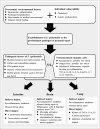Beyond sepsis: Staphylococcus epidermidis is an underestimated but significant contributor to neonatal morbidity
- PMID: 29405832
- PMCID: PMC5955464
- DOI: 10.1080/21505594.2017.1419117
Beyond sepsis: Staphylococcus epidermidis is an underestimated but significant contributor to neonatal morbidity
Abstract
Staphylococcus epidermidis accounts for the majority of cases of neonatal sepsis. Moreover, it has been demonstrated to be associated with neonatal morbidities, such as bronchopulmonary dysplasia (BPD), white matter injury (WMI), necrotizing enterocolitis (NEC) and retinopathy of prematurity (ROP), which affect short-term and long-term neonatal outcome. Imbalanced inflammation has been considered to be a major underlying mechanism of each entity. Conventionally regarded as a harmless commensal on human skin, S. epidermidis has received less attention than its more virulent relative Staphylococcus aureus. Particularities of neonatal innate immunity and nosocomial environmental factors, however, may contribute to the emergence of S. epidermidis as a significant nosocomial pathogen. Neonatal host response to S. epidermidis sepsis has not been fully elucidated. Evidence is emerging regarding the implication of S. epidermidis sepsis in the pathogenesis of neonatal inflammatory diseases. This review focuses on the interplay among S. epidermidis, neonatal innate immunity and inflammation-driven organ injury.
Keywords: Staphylococcus epidermidis; bronchopulmonary dysplasia; inflammatory disorders; innate immunity; necrotizing enterocolitis; neonatal sepsis; preterm infants; white matter injury.
Figures

Similar articles
-
Look Who's Talking: Host and Pathogen Drivers of Staphylococcus epidermidis Virulence in Neonatal Sepsis.Int J Mol Sci. 2022 Jan 13;23(2):860. doi: 10.3390/ijms23020860. Int J Mol Sci. 2022. PMID: 35055041 Free PMC article. Review.
-
The role of Staphylococcus epidermidis in neonatal sepsis: guarding angel or pathogenic devil?Int J Med Microbiol. 2014 Jul;304(5-6):513-20. doi: 10.1016/j.ijmm.2014.04.013. Epub 2014 May 6. Int J Med Microbiol. 2014. PMID: 24881963 Review.
-
Staphylococcus epidermidis and Staphylococcus aureus trigger different interleukin-8 and intercellular adhesion molecule-1 in lung cells: implications for inflammatory complications following neonatal sepsis.Acta Paediatr. 2013 Oct;102(10):1010-6. doi: 10.1111/apa.12350. Epub 2013 Aug 5. Acta Paediatr. 2013. PMID: 23845107
-
An underestimated pathogen: Staphylococcus epidermidis induces pro-inflammatory responses in human alveolar epithelial cells.Cytokine. 2019 Nov;123:154761. doi: 10.1016/j.cyto.2019.154761. Epub 2019 Jun 18. Cytokine. 2019. PMID: 31226437
-
Staphylococcus epidermidis in feedings and feces of preterm neonates.PLoS One. 2020 Feb 3;15(2):e0227823. doi: 10.1371/journal.pone.0227823. eCollection 2020. PLoS One. 2020. PMID: 32012172 Free PMC article.
Cited by
-
Effect of Short-Term Antimicrobial Therapy on the Tolerance and Antibiotic Resistance of Multidrug-Resistant Staphylococcus capitis.Infect Drug Resist. 2020 Jun 30;13:2017-2026. doi: 10.2147/IDR.S254141. eCollection 2020. Infect Drug Resist. 2020. PMID: 32636655 Free PMC article.
-
Long non-coding RNA MALAT1 targeting STING transcription promotes bronchopulmonary dysplasia through regulation of CREB.J Cell Mol Med. 2020 Sep;24(18):10478-10492. doi: 10.1111/jcmm.15661. Epub 2020 Aug 18. J Cell Mol Med. 2020. PMID: 32812343 Free PMC article.
-
Monoclonal antibodies effectively potentiate complement activation and phagocytosis of Staphylococcus epidermidis in neonatal human plasma.Front Immunol. 2022 Jul 29;13:933251. doi: 10.3389/fimmu.2022.933251. eCollection 2022. Front Immunol. 2022. PMID: 35967335 Free PMC article.
-
Staphylococcus epidermidis activates keratinocyte cytokine expression and promotes skin inflammation through the production of phenol-soluble modulins.Cell Rep. 2023 Sep 26;42(9):113024. doi: 10.1016/j.celrep.2023.113024. Epub 2023 Aug 22. Cell Rep. 2023. PMID: 37610872 Free PMC article.
-
Interactions between Host Immunity and Skin-Colonizing Staphylococci: No Two Siblings Are Alike.Int J Mol Sci. 2019 Feb 7;20(3):718. doi: 10.3390/ijms20030718. Int J Mol Sci. 2019. PMID: 30736471 Free PMC article. Review.
References
Publication types
MeSH terms
LinkOut - more resources
Full Text Sources
Other Literature Sources
Medical
